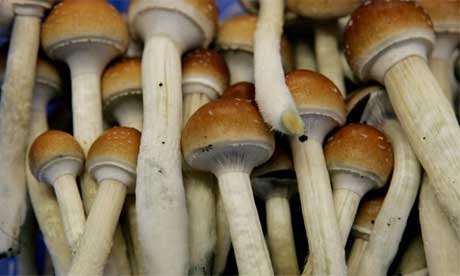· Researchers hope effects will improve quality of life
James Randerson
The Guardian,
Tuesday August 12 2008
 Scientists are exploring the use of psychedelic drugs such as LSD to treat a range of ailments from depression to cluster headaches and obsessive compulsive disorder.
Scientists are exploring the use of psychedelic drugs such as LSD to treat a range of ailments from depression to cluster headaches and obsessive compulsive disorder.The first clinical trial using LSD since the 1970s began in Switzerland in June. It aims to use "psychedelic psychotherapy" to help patients with terminal illnesses come to terms with their imminent mortality and so improve their quality of life.
Another psychedelic substance, psilocybin - the active ingredient in magic mushrooms, has shown promising results in trials for treating symptoms of terminal cancer patients. And researchers are using MDMA (ecstasy) as an experimental treatment for post-traumatic stress disorder.
In the Swiss trial eight subjects will receive a dose of 200 microgrammes of LSD. This is enough to induce a powerful psychedelic experience and is comparable to what would be found in an "acid tab" bought from a street drug dealer. A further four subjects will receive a dose of 20 microgrammes. Every participant will know they have received some LSD, but neither the subjects nor the researchers observing them will know for certain who received the full dose. During the course of therapy researchers will assess the patients' anxiety levels, quality of life and pain levels.
Click here to continue reading this article at The Guardian Website
2 comments:
There are various drug rehab camps available in America. They provide complete healthy and drug free life to addicted people. They give very effective facilities and services to their patients. They also propose different kind of treatment methods.
http://www.drugrehabscenters.com/
Addiction of hallucinogen causes their effects by disturbing the interaction of nerve cells and the neurotransmitter serotonin. Dispersed all through the mind and spinal cord, the serotonin system is involved in the control of behavioral, perceptual, and rigid systems, including temper, hunger, body temperature, sexual manners, muscle control, and sensory awareness. http://www.addiction-treatments.com/
Post a Comment